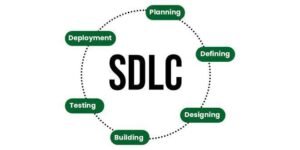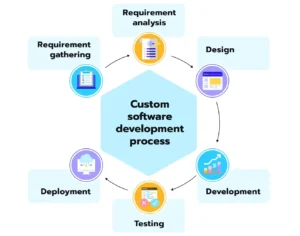Software Development
In today’s digital world, software development is the driving force behind innovation. It’s the process of turning an idea—a solution to a problem, a vision for a product, or a new way to connect with people—into a functional, accessible tool that can change lives. The beauty of software development lies in its ability to break down complex concepts into simple, executable code that powers everything from the apps on our phones to the systems that run our hospitals and cities.

Software development is more than just coding; it’s a structured journey from idea to product. The process begins with identifying a need, followed by careful planning and design to create a user-friendly, effective solution. Then, developers dive into coding, where they build the foundation and features of the software, ensuring it’s both functional and scalable. Testing is a crucial step to catch issues early, and even after launch, regular updates are necessary to keep software relevant and efficient.
- Planning: This initial phase involves gathering requirements, defining the project’s scope, and setting goals for what the software will achieve. It’s crucial to have a clear understanding of the problem you are solving and how the software will address that issue.
- Design: Once the planning phase is complete, the software design phase begins. This involves creating wireframes, user interface (UI) designs, and user experience (UX) plans that outline how the software will function and look. It also includes choosing the appropriate technologies that will be used in development.
- Development: In this phase, the actual code is written. Developers use programming languages like Python, Java, or JavaScript to bring the design to life, turning it into a fully functional product. The code includes both the front end (what users see) and the back end (the server-side operations and databases that power the app).
- Testing: After development, the software is tested for bugs and errors. This step ensures that the software works as intended and meets the defined requirements. Testing can include unit testing, integration testing, performance testing, and user acceptance testing (UAT).
- Deployment and Maintenance: Once testing is complete, the software is ready for deployment. It’s launched and made available for users. However, the work doesn’t stop here. Developers continue to monitor the software for issues, make updates, and release new features based on user feedback and changing needs.
Software Development Building
Solutions That Shape Our
World
“Software development is crucial in driving innovation, as highlighted by TechCrunch’s article on emerging software trends.”
“If you’re interested in learning more about how AI is transforming industries, read our article on AI in software development.”
Shaping the Future:
Today’s software solutions are the building blocks of tomorrow’s world. By creating technologies that are adaptable and scalable, developers lay the groundwork for future innovation. These tools not only meet today’s needs but also set the stage for progress for generations to come.

Moreover, as society faces complex challenges like climate change, healthcare disparities, and urbanization, software development will play a pivotal role in creating solutions that help address these issues. The ability to build systems that can analyze data, make predictions, and optimize processes will be crucial in tackling these global challenges.
To optimize your post using AI content, we can integrate some AI-related ideas, highlight how AI is impacting software development, and make the content more engaging. Below is an optimized version of the 600-word post, incorporating AI concepts
“Interested in learning more about mobile application development? Visit our Mobile Development Solutions page.”
Building Solutions That Shape Our World: The Power of Software Development
Software development is at the heart of modern technology, turning abstract ideas into real-world applications. From mobile apps that simplify daily tasks to enterprise systems that manage global operations, software development touches nearly every aspect of our lives. It’s not just about writing code—it’s about solving problems, enhancing experiences, and driving innovation that shapes the future.
What is Software Development?
“Software development is the process of turning ideas into functional solutions. It combines creativity and technical expertise to build applications that solve real-world problems. From mobile apps to enterprise systems, developers create tools that enhance productivity and improve user experiences.
Through coding, developers bring visions to life, adapting technology to meet evolving business needs. Whether building from scratch or improving existing platforms, software development drives innovation and business growth. Each line of code contributes to shaping the future of technology, creating endless possibilities in a digital world.”
Software development is the process of creating, designing, coding, testing, and maintaining software applications that serve various purposes. This process is essential for building applications that improve business efficiency, connect people, and solve real-world problems.
- Planning: The journey starts with identifying the problem and defining the scope of the software solution. This stage helps outline the software’s goals, features, and functionalities.
- Design: Once the requirements are clear, software designers create wireframes and plan the user interface (UI) and user experience (UX), ensuring the software will be easy to navigate and use.
- Development: The actual coding begins here, where developers use programming languages like Python, Java, and JavaScript to turn designs into functional code. Developers also consider the software’s scalability and maintainability during this phase.
- Testing: After the software is developed, it undergoes rigorous testing to ensure it works as expected. This phase includes bug fixes and improvements based on test results.
- Deployment and Maintenance: Once the software is released to users, developers monitor its performance, fix issues, and release updates regularly to enhance functionality and security.
Why Software Development Matters
The role of software development has evolved far beyond just building apps. It is the driving force behind innovation and global connectivity. The most notable advancement in recent years is the incorporation of artificial intelligence (AI) in software applications, which has revolutionized everything from data analysis to user interactions.
- Business Efficiency: Custom software solutions, such as enterprise resource planning (ERP) and customer relationship management (CRM) systems, have streamlined business operations. AI integration, such as predictive analytics, helps companies forecast trends and make data-driven decisions with greater accuracy.
- Innovation and Problem-Solving: AI and machine learning (ML) have become game-changers in software development. AI-powered applications can automate repetitive tasks, enhance user experience with chatbots, and optimize processes in real-time. For instance, AI algorithms in software development tools like GitHub Copilot assist developers by suggesting code snippets, speeding up the development process.
- Global Connectivity: Software development’s role in enhancing global connectivity is undeniable. Whether through social media platforms or virtual workspaces, software has bridged geographical gaps. With AI-driven translation tools, language is no longer a barrier to communication, making collaboration across borders more seamless.
AI’s Role in Software Development
Artificial intelligence is no longer a futuristic concept—it’s a present-day reality. AI is increasingly being used to improve the software development process itself. For example:
- AI in Code Generation: AI-driven tools like GitHub Copilot use machine learning to assist developers in writing code faster and more efficiently. By understanding the context of what the developer is building, AI can suggest code snippets, identify bugs, and even offer solutions to common coding problems.
- Predictive Maintenance and Testing: AI is revolutionizing software testing and maintenance. Predictive algorithms can analyze data from previous software versions and predict potential failures or areas for improvement. This helps developers anticipate issues before they arise, ensuring smoother software performance post-deployment.
- Intelligent Automation: AI is playing a key role in automating various aspects of the development lifecycle, including testing, bug fixing, and integration. This allows developers to focus on higher-level tasks while the AI handles routine functions.
Some Key Aspect about Software Development
- “Transforming the Future: The Power of Software Development”
- “Revolutionizing Our World: The Impact of Software Development”
- “Innovating Tomorrow: How Software Development Shapes Our Future”
- “Building a Better Future: The Promise of Software Development”
- “Empowering Innovation: The Role of Software Development”
- “Unlocking Possibilities: How Software Development is Shaping the World”
- “Driving Change: The Vital Role of Software Development in Our World”
- “Creating Solutions: How Software Development is Transforming Industries”
Software Development Global Connectivity and
Accessibility:
Software’s power lies in its global reach. Through mobile apps, communication platforms, and learning tools, software connects people from diverse backgrounds and geographies. It breaks down barriers, allowing resources and information to reach communities everywhere.
software development is far more than just a technical skill—it is a powerful force that shapes our world, drives innovation, and builds solutions for the future. By turning ideas into tangible tools, developers solve real-world problems, enhance connectivity, and help us navigate the challenges of tomorrow. As technology continues to evolve, the impact of software development will only grow, offering limitless possibilities to create a better, more connected world for all.
Software development is the backbone of innovation in the digital age. It enables businesses to streamline operations, provides solutions to complex problems, and connects the world in ways never before imagined. As technology evolves, so too will the role of software development in shaping our future. With creativity, skill, and collaboration, developers will continue to build solutions that not only meet the needs of today but also transform our world for generations to come.
List of Blogs
- LIST
- LIST
- LIST
- LIST
- LIST
- LIST
- LIST
- LIST




